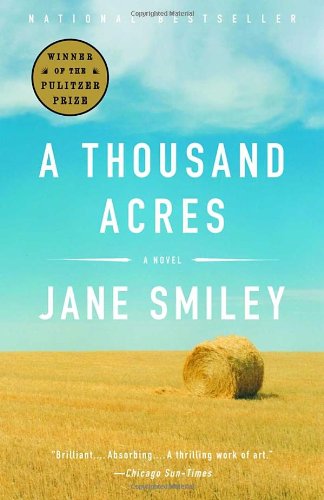A Thousand Acres is the other Iowa book I read on my trip, though by the time I started it, we were driving through the red rock formations of southern Utah and it no longer made much sense. Interestingly, it shares more with Marilynne Robinson's Home than just a setting. Like Home, it is in part the story of a black sheep's homecoming, except Jess Clark isn't an alcoholic like Jack Boughton--worse, he's a draft dodger, and a vegetarian. Like Home, A Thousand Acres is concerned with the difficulty of coming home again, and the way that putting things back together can be as disruptive as tearing them apart.
But where Home takes its literary archetypes from the Bible, A Thousand Acres is a straight up re-telling of King Lear. Jess is the Edmund figure, come home to threaten his brother's inheritance, but the focus of the story is on Ginny, whose name is an echo of "Goneril." The plot is set in motion when Ginny's father, like Lear, prematurely leaves his immense farm (the thousand acres of the title) to his three daughters, Ginny, Rose, and Caroline. (Guess which one is which.)
I have said before that adapting Shakespeare is a dangerous move, because it's not likely that you're going to be able to do it better, and even when you do it well half the time the reader is simply reminded of how good Shakespeare is. What makes A Thousand Acres work in spite of this is a simple tweak Smiley makes in the story: all of the "good" characters from Lear are bad, and the "bad" characters are good. Ginny's father, Larry, is a cruel and inscrutable old man, who quickly realizes that he has given away his livelihood and responds by lashing out at everyone and driving around Iowa piss drunk. He rediscovers his love for the distant Caroline only because her demurral of his offer means that she doesn't share in his resentment. Ginny, on the other hand, does her best to please her tyrannical father, who responds with this parodic version of Lear's epic "Suspend thy purpose if thou didst intend / To make this creature fruitful" speech:
He leaned his face toward mine. "You don't have to drive me around any more, or cook the goddamned breakfast or clean the goddamned house." His voice modulated into a scream. "Or tell me what I can do and what I can't do. You barren whore! I know all about you, you slut. You've been creeping here and there all your life, making up to this one and that one. But you're not really a woman, are you? I don't know what you are, just a bitch, is all, just a dried-up whore bitch."
[Spoiler alert for this paragraph.] This soliloquy hits especially hard because Ginny has tried and failed for years to have a child, suffering through multiple miscarriages, and her father's accusation that she is a slut becomes tragically ironic when Rose helps Ginny remember late in the novel that their father sexually assaulted them both as children. The switched valences don't end there--even Ty, Ginny's husband and the Albany figure, is reimagined so that his sympathy with Lear is conceived as a kind pusillanimous avoidance of conflict, and a failure to support his wife in any meaningful way.
Smiley is no Robinson, and the writing itself is nothing to speak of, but the plot spirals out of control in an especially Shakespearean, and violent, way that was refreshing after the plodding pace of Home, which is mostly about people crying around a kitchen table. I'm not sure, though, what a reader who wasn't familiar with Lear would get out of it--half the fun for me, or even most of it, was seeing the way that each of the characters was flipped.


No comments:
Post a Comment